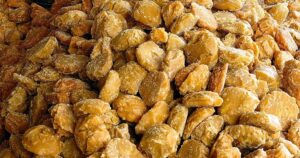Jaggery and Its Impact on Anaemia
Introduction
Anaemia is a prevalent health condition affecting millions worldwide, particularly in developing countries. It is primarily caused by a deficiency of iron, leading to decreased levels of haemoglobin in the blood. This results in fatigue, weakness, dizziness, and impaired cognitive function. Addressing anaemia requires dietary interventions, and one such natural remedy that has been widely recognized is jaggery. Known as a traditional sweetener, jaggery is rich in iron and other essential nutrients that can aid in managing and preventing anaemia.
Nutritional Profile of Jaggery
Jaggery is an unrefined sugar obtained from sugarcane or date palm sap. Unlike white sugar, it retains a significant portion of vitamins and minerals.
The key nutritional components of jaggery include:
Iron: Jaggery contains non-heme iron, which is essential for haemoglobin production.
Folate and Other Micronutrients: Jaggery is a source of folate, which plays a crucial role in red blood cell formation.
Antioxidants: It helps in reducing oxidative stress, which is a contributing factor to various health issues, including anaemia.
Magnesium and Potassium: These minerals support overall blood circulation and energy production.

How Jaggery Helps in Combating Anaemia
Increases Haemoglobin Levels
Jaggery is a rich source of iron, which directly contributes to the production of haemoglobin. Regular consumption can help in increasing haemoglobin levels, thus reducing the risk of anaemia.
Improves Iron Absorption
Though jaggery contains non-haeme iron, which is less easily absorbed by the body compared to haeme iron (from animal sources), consuming it with vitamin C-rich foods such as citrus fruits enhances its absorption.
Boosts Energy Levels
Anaemia often leads to fatigue and weakness. The natural sugars in jaggery provide instant energy, making it beneficial for individuals suffering from anaemia-related lethargy.
Detoxifies the Blood
Jaggery acts as a natural cleanser, helping to flush out toxins from the body, thereby improving blood quality and circulation.
Supports Menstrual Health
Women, especially those with heavy menstrual bleeding, are at a higher risk of anaemia. Jaggery can help replenish lost iron and provide relief from menstrual fatigue.
Best Ways to Include Jaggery in Diet
As a Sweetener: Replace refined sugar with jaggery in tea, coffee, and desserts.
Jaggery and Sesame Seeds: A traditional combination known to boost iron levels.
Jaggery with Lemon Water: Enhances iron absorption due to the presence of vitamin C.
Jaggery and Milk: Drinking warm milk with jaggery before bedtime can help in improving iron levels.
In Traditional Recipes: Many Indian and Ayurvedic recipes incorporate jaggery in ladoos, chikkis, and herbal concoctions for improved health benefits.
Precautions and Considerations
Moderation is Key: Excessive consumption of jaggery can lead to weight gain and elevated blood sugar levels, making it unsuitable for diabetic individuals.
Quality Matters: Ensure that the jaggery used is pure and free from chemical additives.
Dietary Balance: Jaggery should be a part of a well-balanced diet that includes leafy greens, legumes, and other iron-rich foods for maximum benefits.
Conclusion
Jaggery is a natural, nutritious, and effective remedy for combating anaemia. Its iron content, combined with other essential nutrients, makes it a valuable addition to the diet. However, it should be consumed in moderation and complemented with other iron-rich foods for optimal results. By incorporating jaggery into daily meals, individuals at risk of anaemia can take a simple yet effective step towards better health and well-being.

